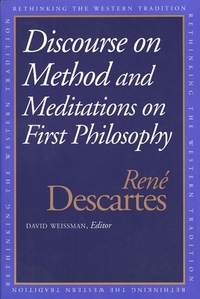Take a photo of a barcode or cover
132 reviews for:
Discourse on the Method and Meditations on First Philosophy
René Descartes, René Descartes
132 reviews for:
Discourse on the Method and Meditations on First Philosophy
René Descartes, René Descartes
challenging
slow-paced
Although I preferred Descartes to Bacon, he was no easy read. Yet, their projects have similarities. Both are concerned with erecting a more perfect system of knowledge than that which had previously been known. Modernism is characterized by this desire for scientific/mathematical certainty, a desire for objectivity. While Modernism granted us many good things (I certainly don't want to go under the knife of a pre-modern surgeon) it also bequeathed to us the myth of objectivity. One of the gifts of Post-Modernism is the affirmation of our storied-ness and the exposure of the possibility of obtaining objectivity for what it is, falsehood.
Descartes: the father of modern philosophy, the scientist who dismantled Aristotelian physics and the man who most inspired Isaac Newton. In many ways, every subsequent philosophical movement even to our present day has been some form of response to his work. In short, the man was a certified genius and Discourse and Meditations are required reading for everyone, not as historical artifacts, but as a sincere attempt at true knowledge.
Again, not a philosophy buff, but rather a student taking an intro to philosophy course.
Of course, Descartes would be included in my intro class. Descartes time and time again has been called the father of modern philosophy.
One thing I enjoyed about his Meditations, is that he writes not as himself but as if he were the reader. The thought process flows (or rather, is supposed to flow) the the sense that it tracks one's train of thought.
That sounds great in theory, however, I had an incredibly difficult time following Descartes' arguments. I found the third meditation the most difficult to follow. His argument for God and the nature of God is full of circular arguments from his perceptions, his thoughts, and his being as a whole.
To be completely honest, I'm not sure how to critique philosophy. While I enjoyed Descartes' thoughts and ideas, the writing and circularity of it convoluted the main points I wanted to obtain from his writing. Nothing solidified in my mind until after class discussion.
Of course, Descartes would be included in my intro class. Descartes time and time again has been called the father of modern philosophy.
One thing I enjoyed about his Meditations, is that he writes not as himself but as if he were the reader. The thought process flows (or rather, is supposed to flow) the the sense that it tracks one's train of thought.
That sounds great in theory, however, I had an incredibly difficult time following Descartes' arguments. I found the third meditation the most difficult to follow. His argument for God and the nature of God is full of circular arguments from his perceptions, his thoughts, and his being as a whole.
To be completely honest, I'm not sure how to critique philosophy. While I enjoyed Descartes' thoughts and ideas, the writing and circularity of it convoluted the main points I wanted to obtain from his writing. Nothing solidified in my mind until after class discussion.
I feel so silly rating classic philosophy texts but here I am. Um, quite frankly Descartes was spittin (considering the time period) and that’s really all I have to say. I’ve had to read sections of this text a couple times in different philosophy courses. This year is the first time I read it all the way through, and even discussed sections with my partner. We had great discussions around it and I really enjoyed taking the text as seriously as I did this time. If you don’t, you just won’t get as much out of it. We all know it suffers from loop logic (aka the Cartesian circle) but reading it is still important, I think.
informative
reflective
medium-paced
challenging
reflective
slow-paced
The famed "I think, therefore I am" lived up to it's expectations. I can see how this book was quite influential for its time, and provided useful insights into the time period, but was an absolute chore to read.
I was able to reflect on the questions asked by Descartes, proving beneficial for my own self. On the other hand, over half the book did not speak to me. His "proof" of God existing was laughable at best and sad at its worst. I guess that was to be expected as this kind of blind faith to religious dogma was commanded at the time.
I was able to reflect on the questions asked by Descartes, proving beneficial for my own self. On the other hand, over half the book did not speak to me. His "proof" of God existing was laughable at best and sad at its worst. I guess that was to be expected as this kind of blind faith to religious dogma was commanded at the time.
After discovering 'I think, therefore I am' I had to read this in high school. I tried reading it in French with little success. I read it again in English and it opened up the Pandora's box of existentialism and philosophy for me. That reasoning and introspection could be so powerful! I wish I had balanced this in college with more spiritual readings as well, as opposed to going down the rabbit hole of Western philosophy and existentialism.
challenging
reflective
slow-paced
5 stars
It is only within the depths of mysticism can rationalism and empiricism spawn. I found this book to be illuminating. It's fun to read Descartes's humble prose while simultaneously blowing my mind. I don't necessarily agree with everything he says at face value, since humanity has come a long way in understanding itself, the brain, psychology, epistemology, and metaphysics. However, this is an unparalleled attempt to understand truth. If I could compare Descartes to anyone, it would have to be Hayy Ibn Yaqzan, thought Hayy is only a fictional character.
There's lots of good quotes and memorable moments here, especially for a philosophy book (which it doesn't read like at all!) I would definitely recommend this book to many so-called "rationalists" today who think they have the self-given providence to deny the existence of God. Now, I'm not saying that God is undoubtedly real after reading this book, but it's hard for me to look at some people claiming they know the world, true and false, human nature, and the like, when I'm willing to bet they haven't gone through such meditations in their own lives, so much as even read this.
If you don't like philosophy reading, give this a chance. Descartes doesn't call himself a philosopher here, he is just talking to himself and illustrating how he understands the world. Descartes is now on my list of dead people to have a drink with if given the chance!
P.S. I might try reading this one in French at some point if I can get my hands on a good copy. I hope it's as fun as this translation!
It is only within the depths of mysticism can rationalism and empiricism spawn. I found this book to be illuminating. It's fun to read Descartes's humble prose while simultaneously blowing my mind. I don't necessarily agree with everything he says at face value, since humanity has come a long way in understanding itself, the brain, psychology, epistemology, and metaphysics. However, this is an unparalleled attempt to understand truth. If I could compare Descartes to anyone, it would have to be Hayy Ibn Yaqzan, thought Hayy is only a fictional character.
There's lots of good quotes and memorable moments here, especially for a philosophy book (which it doesn't read like at all!) I would definitely recommend this book to many so-called "rationalists" today who think they have the self-given providence to deny the existence of God. Now, I'm not saying that God is undoubtedly real after reading this book, but it's hard for me to look at some people claiming they know the world, true and false, human nature, and the like, when I'm willing to bet they haven't gone through such meditations in their own lives, so much as even read this.
If you don't like philosophy reading, give this a chance. Descartes doesn't call himself a philosopher here, he is just talking to himself and illustrating how he understands the world. Descartes is now on my list of dead people to have a drink with if given the chance!
P.S. I might try reading this one in French at some point if I can get my hands on a good copy. I hope it's as fun as this translation!


